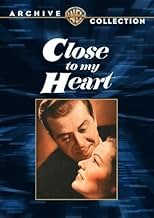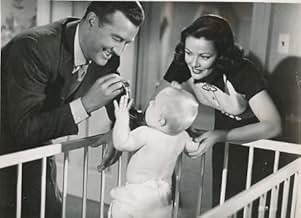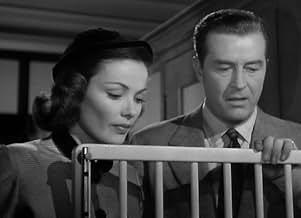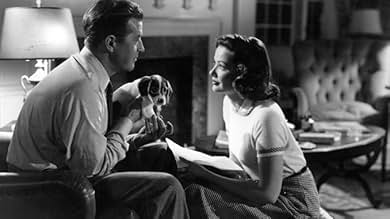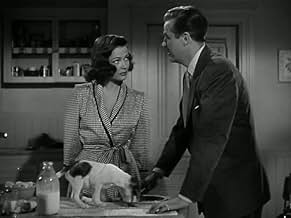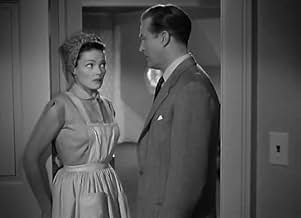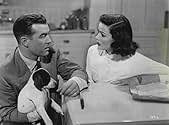A columnist and his wife deal with obstacles when they try to adopt an abandoned baby.A columnist and his wife deal with obstacles when they try to adopt an abandoned baby.A columnist and his wife deal with obstacles when they try to adopt an abandoned baby.
Baby John Winslow
- Baby Danny
- (as Baby John)
John Alvin
- Prospective Adoptive Father
- (uncredited)
Rodney Bell
- Young Parent in Car
- (uncredited)
Nan Boardman
- Woman Patient
- (uncredited)
Ralph Byrd
- Charlie
- (uncredited)
Luther Crockett
- Prison Warden
- (uncredited)
Douglas Hudson Finley
- Baby in other car
- (uncredited)
Elizabeth Flournoy
- Dr. Williams's Receptionist
- (uncredited)
Dick Gordon
- Clothing Store Owner
- (uncredited)
Fred Graham
- Prison Guard
- (uncredited)
Featured reviews
This rather obscure little film from '51 must have been one that attracted GENE TIERNEY, given the circumstances of her private life wherein her own parentage problems came about when her pregnancy resulted in a child born mentally retarded. She puts her heart and soul into her performance here, as the obsessive wife who "must" have a child to call her own regardless of where the child comes from. Hubby RAY MILLAND is more realistic about things and wants to know the background of any infant they adopt.
While she falls completely in love with the adopted infant boy, Milland, who is a newspaper columnist, decides to do his own research into the baby's real parents. Therein, the story takes a few melodramatic turns before the domestic problems are ironed out.
FAY BAINTER is excellent as the head of an adoption agency who wants to make sure both parents are right for the child. Her scenes with Tierney are sensitively played and well scripted. Tierney looks ravishing and there is no trace of the illness which would overtake her career in a few short years.
Milland has some good moments, especially toward the end when he has his final confrontation with Bainter, insisting that he's no longer holding the baby's criminal father as a factor in not signing the final adoption papers, having met with the man in prison and realizing that heredity is not going to poison the child.
Although the presentation is an intelligent enough one, there is the flavor of a Lifetime TV movie to the production (by today's standards), and it verges on being daytime soap opera in quality more than once. But fans of Gene Tierney and Ray Milland will like their performances in this one.
A nice background score by Max Steiner helps, as does the direction of William Keighley.
While she falls completely in love with the adopted infant boy, Milland, who is a newspaper columnist, decides to do his own research into the baby's real parents. Therein, the story takes a few melodramatic turns before the domestic problems are ironed out.
FAY BAINTER is excellent as the head of an adoption agency who wants to make sure both parents are right for the child. Her scenes with Tierney are sensitively played and well scripted. Tierney looks ravishing and there is no trace of the illness which would overtake her career in a few short years.
Milland has some good moments, especially toward the end when he has his final confrontation with Bainter, insisting that he's no longer holding the baby's criminal father as a factor in not signing the final adoption papers, having met with the man in prison and realizing that heredity is not going to poison the child.
Although the presentation is an intelligent enough one, there is the flavor of a Lifetime TV movie to the production (by today's standards), and it verges on being daytime soap opera in quality more than once. But fans of Gene Tierney and Ray Milland will like their performances in this one.
A nice background score by Max Steiner helps, as does the direction of William Keighley.
This is a pretty good little film about a couple adopting a baby. It works best when it is looking at the couple at home dealing with the new child, or when they adopt a puppy as a substitute. This is all quite charming and although Gene Tierney is a little cloyingly sweet at times (and I might add ravishingly beautiful), Ray Milland is very good. Where the film is less successful is when it traces Milland's search for the baby's real parents - this all becomes a tad melodramatic. And Fay Bainter's oh-so-well-meaning adoption agency supervisor comes over as so mean and heartless in her treatment of Tierney that the film becomes unbelievable. She tortures the poor woman! Milland's final impassioned monologue to Bainter is impossible for any actor to play but Milland has a good stab at it. Overall very entertaining.
I remembered this movie from years ago, and somehow I had it stuck in my mind that James Stewart played the husband - it was the kind of role he was good at, especially the emotional closing scenes, but instead it is Ray Milland as journalist Brad Sheridan and Gene Tierney as Midge Sheridan. The opening scene shows a doctor telling Midge that she will never be able to have a child. She takes the news hard, but then she and her husband of four years begin looking for a baby.
They go to an adoption agency - actually Midge does - and is told there is a two year waiting list by the sympathetic head of the agency, Mrs. Morrow (Fay Bainter). But they get a tip about a foundling left at a police station, and Midge goes to visit him. She goes to visit every day at the orphanage, bathes him, cares for him, brings him dolls. Eventually the Sheridans get permission to take him home with them in hopes it will lead to adoption. They name the child "Danny" in the meantime.
Midge doesn't care who his parents are, but Brad is not so sure, especially when he finds out about an adopted boy who became a criminal in spite of being brought up in a good adoptive home. Mrs. Morrow is worried that if Brad finds out his parentage is "bad" that he will never treat Danny like a true blank slate. However, part worry over the possible mental heritage of Danny, part the natural curiosity of a blood-hound reporter has him chasing leads to find out how Danny came to be abandoned and who did the abandoning. What does he find out? Watch and find out.
This really is a sentimental journey, and you have to leave your modern sensibilities on hold to enjoy this little story from 66 years ago. How can a middling journalist afford a house that looks like a bank president's on one salary? Why does Midge go to the doctor to learn of her infertility AND to the adoption agency alone? Why does Midge dress to the nines to clean house and handle the baby? Doesn't Mrs. Morrow have anything better to do than to follow Brad's search for Danny's parents? You are just going to have to forget about these questions.
The acting here is quite good, and Ray Milland shows a side of his acting chops as a normal family man that he seldom got to do over at his home studio of Paramount. As usual, Max Steiner's score sets just the right mood. Do note that not everybody in the 50s agreed with what this film was trying to say about criminology here. For an alternate view watch 1956's "Bad Seed".
They go to an adoption agency - actually Midge does - and is told there is a two year waiting list by the sympathetic head of the agency, Mrs. Morrow (Fay Bainter). But they get a tip about a foundling left at a police station, and Midge goes to visit him. She goes to visit every day at the orphanage, bathes him, cares for him, brings him dolls. Eventually the Sheridans get permission to take him home with them in hopes it will lead to adoption. They name the child "Danny" in the meantime.
Midge doesn't care who his parents are, but Brad is not so sure, especially when he finds out about an adopted boy who became a criminal in spite of being brought up in a good adoptive home. Mrs. Morrow is worried that if Brad finds out his parentage is "bad" that he will never treat Danny like a true blank slate. However, part worry over the possible mental heritage of Danny, part the natural curiosity of a blood-hound reporter has him chasing leads to find out how Danny came to be abandoned and who did the abandoning. What does he find out? Watch and find out.
This really is a sentimental journey, and you have to leave your modern sensibilities on hold to enjoy this little story from 66 years ago. How can a middling journalist afford a house that looks like a bank president's on one salary? Why does Midge go to the doctor to learn of her infertility AND to the adoption agency alone? Why does Midge dress to the nines to clean house and handle the baby? Doesn't Mrs. Morrow have anything better to do than to follow Brad's search for Danny's parents? You are just going to have to forget about these questions.
The acting here is quite good, and Ray Milland shows a side of his acting chops as a normal family man that he seldom got to do over at his home studio of Paramount. As usual, Max Steiner's score sets just the right mood. Do note that not everybody in the 50s agreed with what this film was trying to say about criminology here. For an alternate view watch 1956's "Bad Seed".
Uncommonly beautiful California housewife Gene Tierney (as Midge) is devastated. Doctors have told Ms. Tierney she will not be able to bear children. Being a "stay at home mom" is out of the question, so "Post" newspaper columnist husband Ray Milland (as Brad Sheridan) buys Tierney a puppy. The dog is precious, but it's not the same as having a baby. "Life is more than just babies," explains Mr. Milland, "we can be footloose." But Tierney is still teary-eyed. Milland suggests the couple adopt a child, and Tierney beams. Alas, the waiting time could take two years. Their luck changes, however, when abandoned baby John Winslow (as Danny) is mysteriously left on a police station doorstep...
Even before she sees him, Tierney is immediately attached to the baby. But Milland wants to know more about the child. His desire to investigate baby Danny's possibly unstable background puts a strain on the Sheridan relationship. Adoption specialist Fay Bainter (as Mrs. Morrow) wonders if Milland displays the proper level of fatherly love. "Close to My Heart" is a good looking production, much like a soap opera with one storyline. Director William Keighley gives it a classic look. The intriguing part of the story involves Milland pondering the "nature vs nurture" question. He hopes "bad blood" is not inherited. The resolution is satisfying and baby "Danny" delivers a cute, natural performance.
****** Close to My Heart (1951-10-10) William Keighley ~ Ray Milland, Gene Tierney, Fay Bainter, John Winslow
Even before she sees him, Tierney is immediately attached to the baby. But Milland wants to know more about the child. His desire to investigate baby Danny's possibly unstable background puts a strain on the Sheridan relationship. Adoption specialist Fay Bainter (as Mrs. Morrow) wonders if Milland displays the proper level of fatherly love. "Close to My Heart" is a good looking production, much like a soap opera with one storyline. Director William Keighley gives it a classic look. The intriguing part of the story involves Milland pondering the "nature vs nurture" question. He hopes "bad blood" is not inherited. The resolution is satisfying and baby "Danny" delivers a cute, natural performance.
****** Close to My Heart (1951-10-10) William Keighley ~ Ray Milland, Gene Tierney, Fay Bainter, John Winslow
Housewife Gene Tierney cannot have a baby, and does not want to wait two years until the adoption agency makes one available to her. Columnist Ray Milland, on the other hand, goes into passive-aggressive mode, when Tierney, acting on a tip from a friend, offers to adopt a baby simply dropped off at the local police station. Will Milland's zealous attempts at finding out the true parentage of the baby cause Faye Bainter's quietly authoritarian adoption agency to determine that Milland and Tierny are unfit to hold little baby Danny CLOSE TO MY HEART?
1951 was one of the peak years of the baby boom, and this movie is a fascinating window into an era in which a woman wanting "a baby for every room" was not thought to be unusual. Tierney, in her single-minded desire to get herself a nice newborn baby right now, without delay, feels more than a little neurotic, to this modern viewer's eyes. Bet she was viewed as just normal, back then. Milland, who seems to have no problem being childless, appears to be the more normal character, even when he gets a little obsessed about finding out where this baby he's adopting actually came from. I think the movie makers were trying to get us to think he was the weird one. Faye Bainter, who plays the caseworker from the adoption agency, does a dead on interpretation of a sweet-seeming, but ultimately rather cold bureaucrat.
The quality of the acting is exemplified towards the end, when Milland comes home to a quietly angry Tierney. The dynamic of a somewhat oblivious husband who suddenly realizes he may have totally destroyed his relationship, and an equally oblivious wife who has manipulated herself into thinking divorce for the first time in her life, is rarely this realistically portrayed.
This is worth seeing, mostly for the acting, and the unusual for the day subject matter. If you want noir or tough guys, though, look elsewhere. This is almost the 50s equivalent of a movie that would play on Lifetime.
1951 was one of the peak years of the baby boom, and this movie is a fascinating window into an era in which a woman wanting "a baby for every room" was not thought to be unusual. Tierney, in her single-minded desire to get herself a nice newborn baby right now, without delay, feels more than a little neurotic, to this modern viewer's eyes. Bet she was viewed as just normal, back then. Milland, who seems to have no problem being childless, appears to be the more normal character, even when he gets a little obsessed about finding out where this baby he's adopting actually came from. I think the movie makers were trying to get us to think he was the weird one. Faye Bainter, who plays the caseworker from the adoption agency, does a dead on interpretation of a sweet-seeming, but ultimately rather cold bureaucrat.
The quality of the acting is exemplified towards the end, when Milland comes home to a quietly angry Tierney. The dynamic of a somewhat oblivious husband who suddenly realizes he may have totally destroyed his relationship, and an equally oblivious wife who has manipulated herself into thinking divorce for the first time in her life, is rarely this realistically portrayed.
This is worth seeing, mostly for the acting, and the unusual for the day subject matter. If you want noir or tough guys, though, look elsewhere. This is almost the 50s equivalent of a movie that would play on Lifetime.
Did you know
- TriviaThe Sheridans' car is a 1951 Ford Custom Deluxe convertible coupe.
Details
- Runtime
- 1h 30m(90 min)
- Color
- Aspect ratio
- 1.37 : 1
Contribute to this page
Suggest an edit or add missing content

